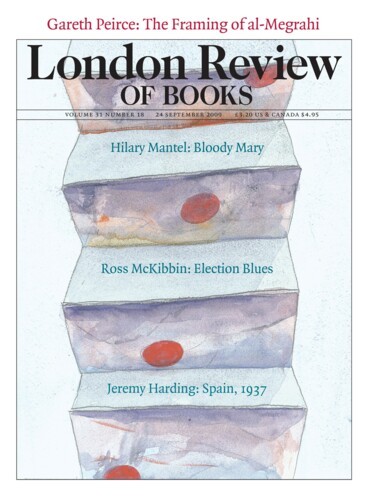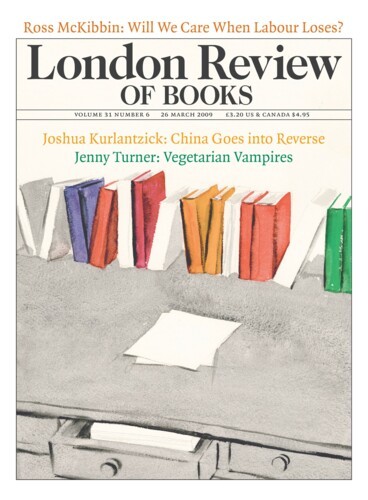Is it too late for the Labour Party to do anything? The delegates at this year’s conference appear not to think so. They loved Peter Mandelson and were coaxed into being enthusiastic about Gordon Brown. But the role of delegates at Labour’s stage-managed conferences now is to be enthusiastic: that's what they're there for. The electorate outside the doors and the security men is unlikely to be so thrilled. Mandelson’s speech, though it certainly had spirit, was precisely the kind of mannered, self-conscious performance that most voters find really offputting. Brown’s speech was certainly not mannered.
Ross McKibbin
Ross McKibbin is an emeritus research fellow at St John’s College, Oxford.
Will we notice when the Tories have won? Election Blues
Ross McKibbin, 24 September 2009
Labour and the Conservatives do not always agree about what the state might do, but they agree about its institutions and hierarchies. That is why Labour has never been able to free itself from the inherited in stitutions of the British state: king-in-Parliament, a state church, a semi-medieval constitution, an overblown defence and security apparatus. And when it has tinkered with the state, even on important issues like devolution or the new supreme court, that has served only to make the whole system even more incoherent.
Although everyone is denying it, European public opinion is obviously being softened up, especially by the Kinnockian wing of the Labour party, for Blair’s emergence as the first full-time president of Europe. And although in a rational world his election would seem self-evidently absurd, given his record, it is being put about that many European leaders – including, improbably, Sarkozy – are enthusiastic. If they are, they should ask themselves what a Blair presidency would actually mean. Blair does not share the Conservatives’ blockheaded hostility to ‘Europe’ but he would nonetheless be the candidate of the United States – and that is what the Tories want. America has never shared the Conservative Party’s extreme Atlanticism. It believes in ‘Europe’ and always wanted Britain to join the EEC, now the EU. But it certainly does not believe in the European ideal.
The Orwell Prize committee this year introduced a new prize for political blogging. It has been won by an anonymous 'English detective' who calls himself 'NightJack'. His posts are a mixture of general comment and diary accounts of apparently typical days in the lives of English policemen. They are vigorously written and sometimes perfectly reasonable. NightJack regrets that the police today are kitted out as imperial stormtroopers, he has little nostalgia for the old canteen culture, he laments the mass of paperwork that has been foisted on the police (like everyone else in the public sector) and fairly argues that if plea-bargaining is to become entrenched it ought to be formalised. Thereafter, however, reasonableness ends.
Will We Care When Labour Loses? Gordon Brown’s Failures
Ross McKibbin, 26 March 2009
The crisis is systemic: it’s not merely about overpriced houses or busted banks, it’s about the Labour Party and the way it has chosen to govern the country: the privatisations; the money-grubbing; the disastrous relationship with the United States, which has infantilised the country’s political elites and so damaged its interests. In sum, it’s about a political system that now seems almost beyond reform.
Pieces about Ross McKibbin in the LRB
Blame Lloyd George: England 1914-51
W.G. Runciman, 27 May 2010
When Oxford University Press commissioned Ross McKibbin to write the volume in the New Oxford History of England covering the years 1918 to 1951, they got more than they bargained for. McKibbin...
Mister Sheppard to you: Classes and Cultures: England 1918-51 by Ross McKibbin
R.W. Johnson, 21 May 1998
Ross McKibbin’s remarkable study of the way the cultures of class shaped English society has, at a stroke, changed the historiographical landscape. One learns more about almost any aspect...
Ross McKibbin and the Rise of Labour
W.G. Runciman, 24 May 1990
In 1984, Ross McKibbin published an article in the English Historical Review called ‘Why was there no Marxism in Great Britain?’ His choice of title was a deliberate invocation of the...
Read anywhere with the London Review of Books app, available now from the App Store for Apple devices, Google Play for Android devices and Amazon for your Kindle Fire.
Sign up to our newsletter
For highlights from the latest issue, our archive and the blog, as well as news, events and exclusive promotions.



